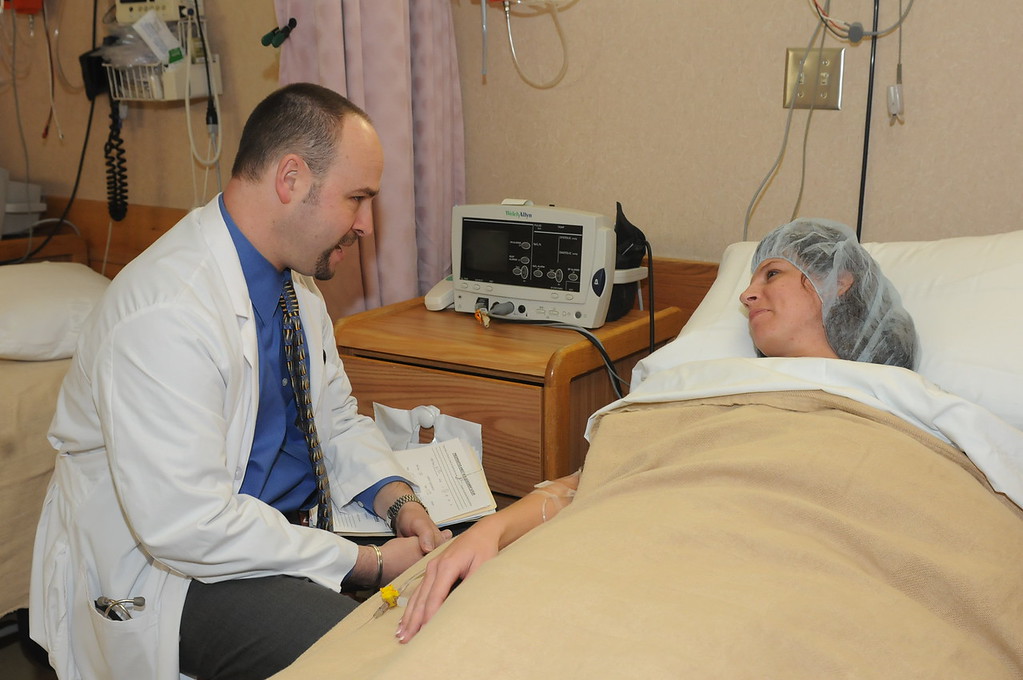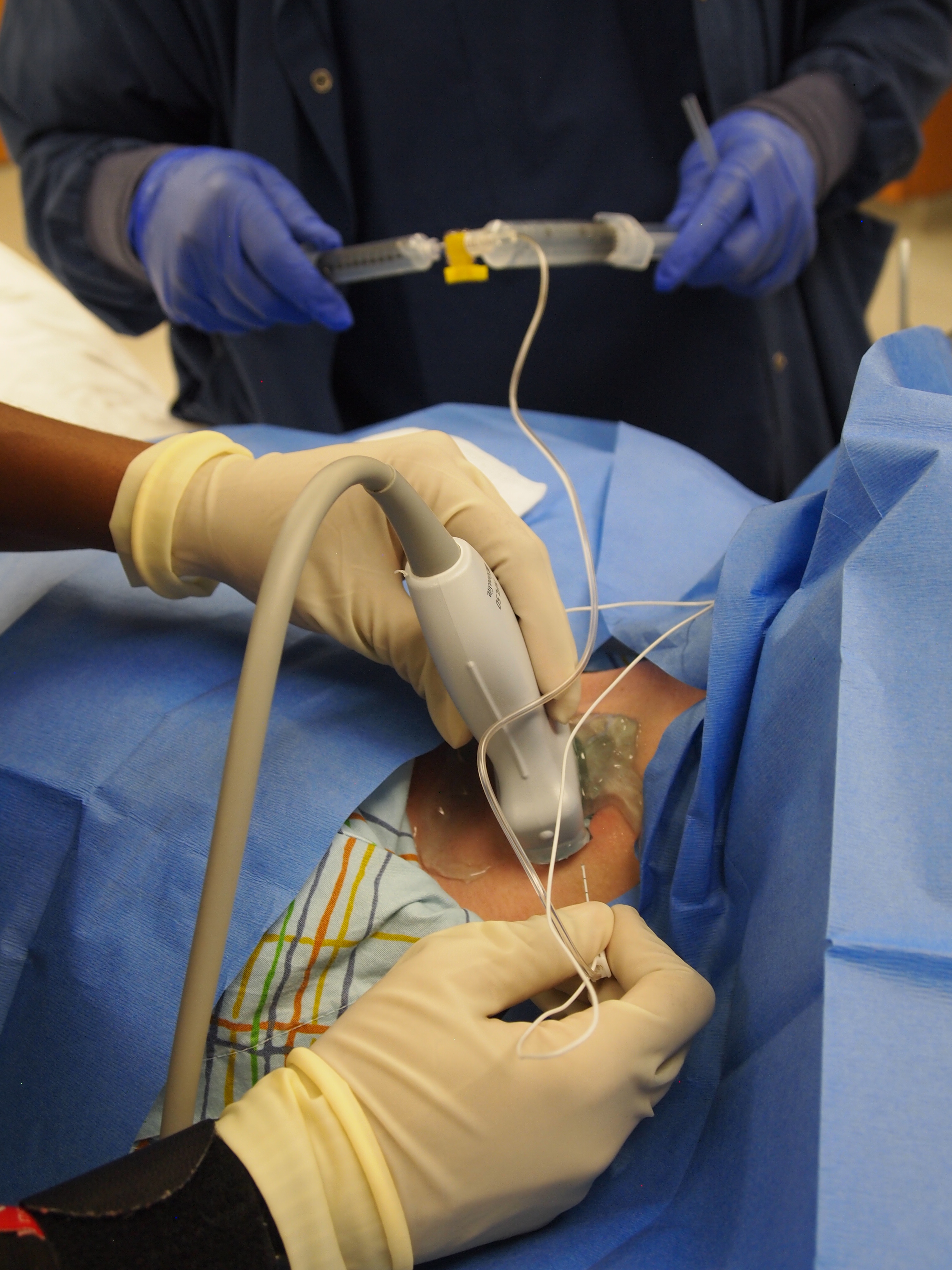For Patients
CRNAs: At Your Side, One Your Side
If you (or a loved one) require anesthesia for surgery or another procedure, it important to learn all you can about the anesthesia options available to you, what you will need to do before and after your procedure, who will be taking care of you, possible side-effects you may experience, and more.
 This section of the NCANA wesbite provides an overview of anesthesia care and serves as a springboard to additional questions you may want to ask your anesthesia professional. In North Carolina, your anesthesia care will most often be provided by a Certified Registered Nurse Anesthetist (CRNA). CRNAs are highly qualified anesthesia experts who care for patients in the majority of healthcare facilities across the state where anesthesia services are required for surgery, labor and delivery, trauma care, or pain management. In rural and other medically underserved counties, CRNAs are often the sole anesthesia professionals serving their communities. This section of the NCANA wesbite provides an overview of anesthesia care and serves as a springboard to additional questions you may want to ask your anesthesia professional. In North Carolina, your anesthesia care will most often be provided by a Certified Registered Nurse Anesthetist (CRNA). CRNAs are highly qualified anesthesia experts who care for patients in the majority of healthcare facilities across the state where anesthesia services are required for surgery, labor and delivery, trauma care, or pain management. In rural and other medically underserved counties, CRNAs are often the sole anesthesia professionals serving their communities.
Rest assured: CRNAs stay with their patients throughout their procedure, ensuring their comfort and safety start to finish.
Anesthesia Basics
 Before Your Procedure Before Your Procedure
CRNA care begins during the preanesthesia interview prior to your procedure. This meeting between you and your CRNA provides an opportunity for you to get answers to your questions. Just as important, it enables your CRNA to learn everything there is to know about your current health and your healthcare history. With this valuable information, your CRNA will develop an anesthesia care plan to best meet your needs before, during and after your procedure.

During Your Procedure
Your CRNA will stay with you throughout your procedure, monitoring your vital signs, adjusting your anesthetics and other medications, and ensuring your overall comfort and safety. One of the hallmarks of CRNA care is this: Your CRNA will be at your side from the time you enter the procedure room to the time you are transferred safely to recovery. Another hallmark of CRNA care is being on your side—advocating on your behalf at a time when you are most vulnerable.
After Your Procedure
Your CRNA will make sure you are properly transferred from the care of your healthcare team in the procedure room to the care of other healthcare specialists in the appropriate recovery area.
By being as informed as possible about the healthcare experience you are about to undergo and becoming an active “partner” in your own care, you will approach your procedure with more confidence and less apprehension.
Anesthesia Questions & Answers
What is anesthesia?
Anesthesia is a safe and effective means of alleviating pain during surgery, labor and delivery, trauma care, and other procedures.
Who provides anesthesia?
Across the country, nearly 60,000 nurse anesthetists safely administer more than 50 million anesthetics to patients each year. There are more than 3,400 CRNAs in North Carolina alone! CRNAs are highly educated anesthesia experts who work closely with surgeons, dentists, podiatrists and other qualified healthcare professionals. CRNAs are not required to work with anesthesiologists, and often do not.
How do CRNAs and anesthesiologists differ?
It is far more accurate to ask, “How are they similar?” CRNAs and anesthesiologists provide anesthesia care using the same techniques and medications, to patients of all ages, in every type of healthcare setting, for every type of procedure that requires anesthesia. CRNAs are often the sole anesthesia provider involved with a patient’s care, especially in states with a great deal of rural communities, such as North Carolina.
Is nurse anesthesia a new profession?
No. Nurse anesthetists were the first recognized anesthesia professionals in the United States and have been providing patients freedom from pain for more than 150 years.
What are my anesthesia options?
Patients should discuss their anesthesia options in detail with their CRNA, but the three basic types of anesthesia are:
- General anesthesia, which produces a loss of sensation throughout the entire body.
- Regional anesthesia, produces a loss of sensation to a specific region of the body.
- Local anesthesia, which produces a loss of sensation to a small specific area of the body.
Add pictures of general, regional and local anesthesia
Will my anesthesia provider stay with me during my procedure?
If your anesthesia is provided by a CRNA, he or she will be with you during your procedure from start to finish.
What are the benefits of Enhanced Recovery after Surgery (ERAS®)?
ERAS is a collaborative approach to pain management which involves the patient, CRNA, and entire care team. This patient-centered strategy relies on robust patient communication and opioid-sparing techniques such as regional anesthesia, peripheral nerve blocks, and non-opioid medications. ERAS reduces the need for opioids, improves patient outcomes, and reduces healthcare costs.
My back is killing me!” Can a CRNA help manage my pain?
Chronic pain afflicts millions of Americans. CRNAs are specifically educated and trained to care for pain patients by delivering anesthetic injections around nerves and other treatments.
How safe is anesthesia?
While having anesthesia for a procedure is not without risk, the National Academy of Medicine has identified anesthesia as one of the safest healthcare experiences a patient can undergo.
What are the possible side-effects of anesthesia?
Most side-effects from anesthesia are minor and temporary, while some can be more serious. It is important for you to know that patient deaths related to anesthesia are extremely rare. Side-effects to be aware of include:
- Nausea and vomiting
- Reaction to anesthesia due to existing healthcare conditions
- Drug interactions
- Post-operative cognitive disfunction such as long-term memory loss or learning problems (more common in older patients)
- Malignant hyperthermia (a rare genetic condition that causes one’s body temperature to spike but is reversible via antidote)
For your peace of mind, discuss these and other concerns you may have with your CRNA during your preanesthesia interview.
I don’t want to wake up during my procedure. Should I be worried?
Anesthetic awareness occurs very rarely. It is more common in certain procedures (e.g., trauma). Sometimes when patients are not under general anesthesia they may misinterpret pressure or other sensations for being awake. CRNAs pride themselves on remaining vigilant at all times while providing anesthesia to ensure their patients remain pain free, unaware, and at the appropriate level of consciousness for the procedure.
|
 This section of the NCANA wesbite provides an overview of anesthesia care and serves as a springboard to additional questions you may want to ask your anesthesia professional. In North Carolina, your anesthesia care will most often be provided by a Certified Registered Nurse Anesthetist (CRNA). CRNAs are highly qualified anesthesia experts who care for patients in the majority of healthcare facilities across the state where anesthesia services are required for surgery, labor and delivery, trauma care, or pain management. In rural and other medically underserved counties, CRNAs are often the sole anesthesia professionals serving their communities.
This section of the NCANA wesbite provides an overview of anesthesia care and serves as a springboard to additional questions you may want to ask your anesthesia professional. In North Carolina, your anesthesia care will most often be provided by a Certified Registered Nurse Anesthetist (CRNA). CRNAs are highly qualified anesthesia experts who care for patients in the majority of healthcare facilities across the state where anesthesia services are required for surgery, labor and delivery, trauma care, or pain management. In rural and other medically underserved counties, CRNAs are often the sole anesthesia professionals serving their communities.
 Before Your Procedure
Before Your Procedure

